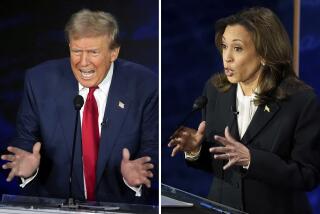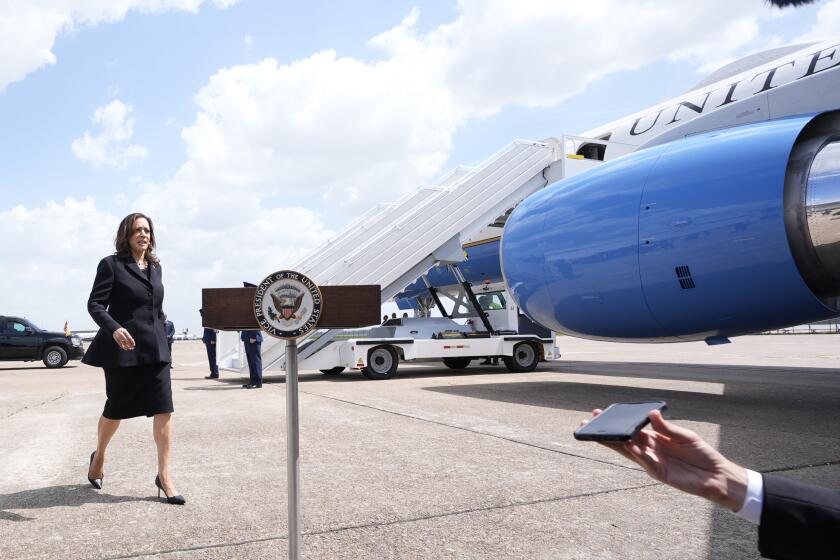As Economic Mood Rises, So May Prospects of GOP
Americans have become more optimistic about the economy, and President Bush is getting some of the credit, a new Times/Bloomberg poll shows.
As voters say the economy will influence their choices in November more than any other national issue, including the war in Iraq and terrorism, Republicans seeking reelection could benefit.
Consumer confidence fell this summer as gas prices peaked and the housing market weakened, particularly in California. Those polled in July were almost evenly split on the state of the economy, with 49% saying it was doing badly.
Now, however, the optimists outnumber the pessimists by 10 percentage points, with 54% saying the economy is doing well.
“There’s a lot of conflicting indicators, but things seem to be cruising along pretty steadily,” said respondent David Busch, 38, a sales executive in Redmond, Wash., who describes himself as an independent voter. “We’ve seen a lot of alarmist talk about housing bubbles bursting, gas prices ... that are going to derail the economy, that haven’t materialized.”
Seven weeks before the midterm elections, the economy remains voters’ primary focus. Among registered voters, 32% listed the economy and jobs as the most important election issue, followed by the war in Iraq (21%), immigration (17%) and the war on terrorism (13%).
In follow-up interviews, those polled cited a variety of reasons for feeling better about the economy, including unemployment at a low 4.7% nationally, lower gas prices this month and an interest rate freeze by the Federal Reserve.
That could be good news for Republican candidates, as their party is in power in Washington and may be able to take some credit for the economy.
When the economy is rocky, voters traditionally punish the party in power, said Bruce Oppenheimer, a political science professor at Vanderbilt University in Nashville. But when the economy is doing well, their reactions are more difficult to predict, he said.
“This year it’s a little more complex to figure because it’s clear that the objective measures of how the economy is doing are not striking everybody equally,” Oppenheimer said. For instance, pay is rising for some college-educated professionals, but most workers face wage stagnation, he said.
Though falling gas prices could boost Republican candidates, he said, “the question is, will it be too little too late?”
The Times/Bloomberg poll interviewed 1,517 adults, including 1,347 registered voters, nationwide from Saturday to Tuesday under the supervision of Times Poll Director Susan Pinkus. The margin of sampling error is plus or minus 3 percentage points.
Although more than half of those polled still disapprove of Bush’s handling of the economy, the proportion of those who approve has risen: 43% said they approved, up from 38% in July.
“Everything seems to be going all right. I don’t hear a lot of people complaining that much about the economy.... The Feds have kept the interest rates down, so that will probably help,” said Chester “Chet” Kusmitch, 69, a retired union carpenter in Crystal Falls, Mich.
Kusmitch said the president was doing a good job handling the economy. “You can’t blame everything on the president, for crying out loud.... A lot of things affect the economy.”
Charles Gunnells, 54, a disabled diesel mechanic and registered Republican in Salyersville, Ky., said he had doubts about the economy but thought Bush was doing “about as good a job as anybody else could be doing.”
He said his opinion of the president had improved in recent weeks as he watched prices at the gas pump drop. “I feel a lot better about it when I see the prices go down,” Gunnells said.
Many of those polled agree -- 26% said high oil prices were the greatest threat to the economy today, far ahead of other factors such as foreign competition (18%) and terrorism (16%).
The average price of gas rose to $3.08 in August before dropping to $2.54 this week, according to the Department of Energy. The dip in oil and gas prices is increasing most Americans’ confidence in the economy, said Chuck Williams, dean of the business school at the University of the Pacific in Stockton.
“People see the economy in terms of their daily expenses -- what is it going to cost to pick up their child from day care, what does it cost to buy lunch, what does it cost to fill the tank of their car. And if someone’s driving an SUV and it’s 100 bucks every time you fill up, that gets your attention,” Williams said. “If the price is down by 50 cents a gallon, you notice it.”
But he said consumers’ optimism was tempered by uncertainty about fuel prices as winter approached and by a weakening housing market on both coasts. Homes are lingering on the market in Phoenix, Philadelphia and Washington, D.C., and fewer homes are being built. Last month, new home starts were down nearly 20% from last year and 6% from July, the Commerce Department reported Tuesday.
In the poll, 53% of respondents said they expected home prices to remain unchanged six months from now, and 19% expected prices to drop. Both numbers are up 4 percentage points from June. A quarter of respondents from households earning $60,000 to $100,000 worry their home will lose value during the next six months, the poll shows.
“Six or twelve months ago, pretty much everybody thought housing prices were going to go up,” said Stuart Hoffman, chief economist at PNC Financial Services Group in Pittsburgh. “Clearly people have changed their expectations. A little bit of reality has set in.”
Donna Bushby, 41, a part-time office worker, said she was getting nervous about the cost of heating her home this winter in the Chicago suburb of Elmwood Park. She and her husband, a truck driver for United Parcel Service, also worry about the value of their home. Six houses on their street are not selling, and one has been on the market for a year and a half.
The couple earn enough to cover expenses for a family of five but not to save, Bushby said, and consider home equity as savings -- “so if you think of your house going down, that’s like your nest egg going down.”
Many Americans appear to be stretching to make ends meet around the house. More than half of those polled, 53%, said they had trouble keeping up with rising costs, including 30% of those with household incomes more than $100,000.
“People’s paychecks are not going up as much as the prices around us,” said Bushby, who is nonetheless optimistic. “Hopefully it’s temporary.”
Geoffrey Gray Sr., 56, a registered Republican, said that he thought Bush had mismanaged the economy and that he worried about the future. Although Gray’s house in Reading, Pa., is paid for and the local market seems unlikely to collapse, he worries about poor families and “the shrinking middle class.”
“People are living paycheck to paycheck,” he said.
Many of those polled, especially working-class Americans, are unsure about their finances and are postponing major purchases such as cars, vacations and large appliances. Of those polled, 64% said now was not a good time to make major purchases, including 81% of those with household incomes less than $40,000, and 66% of those between $40,000 and $60,000.
“If I do make a big purchase,” said Bushby, “it may be a hybrid car.”
molly.hennessy-fiske@
latimes.com
*
(BEGIN TEXT OF INFOBOX)
Financial challenges
Q. Taking into account the cost of living and the amount of money you have to spend, would you say your financial situation right now is good, or bad, or somewhere in between?
*--* Household Income (in thousands) More All Less than $40- $60- than $40 $60 $100 $100 Good 38% 13% 42% 53% 72% Bad 14 29 6 7 1 In between 47 56 52 40 25 Don’t know 1 2 - - 2
*--*
---
Q. How about next year? Do you think your financial situation 12 months from now will be better or worse than this year, or will it be about the same?
*--* Household Income (in thousands) More All Less than $40- $60- than $40 $60 $100 $100 Better 36% 28% 32% 50% 42% Worse 11 17 11 4 8 Same as this 50 51 56 45 49 year Don’t know 3 4 1 1 1
*--*
---
Q. Generally speaking, have your household income and the tax cuts you received in recent years kept up with the rising energy prices and other household costs, or has your household income not been able to keep up with the rising costs?
*--* Household Income (in thousands) More All Less than $40- $60- than $40 $60 $100 $100 Kept up 42% 29% 46% 48% 65% Has not kept 53 65 50 50 30 up Doesn’t apply 3 3 2 2 3 Don’t know 2 3 2 - - 2
*--*
---
Q. Considering your financial situation, is now an excellent, good, not-so-good or poor time to buy expensive items such as large appliances, video equipment and computers, vacation trips, and automobiles?
*--* Household Income (in thousands) More All Less than $40- $60- than $40 $60 $100 $100 Excellent 3% - 2% 4% 6% Good 20 9 21 32 36 Not so good 28 24 34 29 24 Poor 35 58 32 20 19 Neither (vol.) 10 7 8 13 14 Don’t know 4 3 3 2 1
*--*
---
Notes: *Polls from 2003-2005 were conducted by LA Times alone
(-) indicates less than 0.5%
(vol.) indicates a volunteered response
Poll results are also available at www.latimes.com/timespoll.
---
How the poll was conducted: The Los Angeles Times/Bloomberg poll contacted 1,517 adults nationwide by telephone Saturday through Tuesday. Telephone numbers were chosen from a list of all exchanges in the nation, and random-digit dialing techniques allowed listed and unlisted numbers to be contacted. Multiple attempts were made to contact each number. The adult population was weighted slightly to conform with census figures for sex, race, age, education and region. The margin of sampling error for all adults, is plus or minus 3 percentage points. For certain subgroups, the error margin may be somewhat higher. Poll results may also be affected by factors such as question wording and the order in which questions are presented.
Source: L.A. Times/Bloomberg poll
More to Read
Get the L.A. Times Politics newsletter
Deeply reported insights into legislation, politics and policy from Sacramento, Washington and beyond. In your inbox three times per week.
You may occasionally receive promotional content from the Los Angeles Times.











